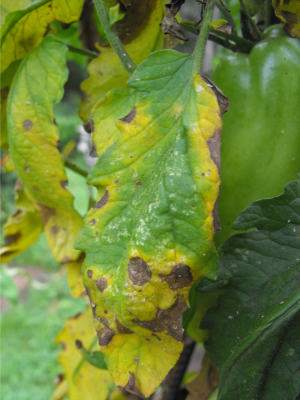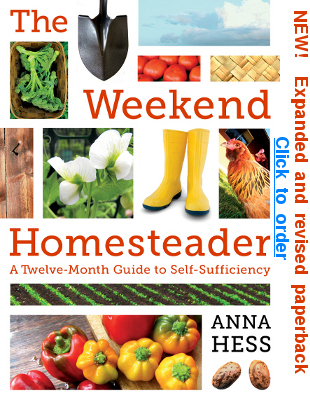
Garden rotation
 You've
probably heard the term "garden rotation" before, but what does
it mean and why do we do it?
You've
probably heard the term "garden rotation" before, but what does
it mean and why do we do it?
Let's start with the
example of early blight, a fungal
disease that hits
tomatoes in warm, damp weather. Mainstream
tomato growers spray anti-fungal chemicals on their plants to
keep early blight at bay, but those of us gardening organically have to
come up with another solution. I won't go into the specifics of
combating
tomato fungal diseases organically here. The
relevant point is that once your tomatoes come down with early blight,
the fungal spores can survive in the soil for years. So if you
plant tomatoes in the same ground next year, they're going to be
infected with early blight nearly immediately and you may get no crop
at all.
Okay, you say, that's
not too tough. I'll just move my tomatoes
every year. But here's the thing --- tomatoes and potatoes are in
the same family, and they tend to share a lot of diseases.
 Late blight is a fungal
disease that's much more devastating than early
blight, but, luckily for us, late blight can only survive in
living plant tissue. Since tomatoes shrivel up and die at the
first sign of frost, you don't need to worry about late blight being
carried over from one year to the next...unless you grow
potatoes. Have you ever noticed that it's nearly impossible to
harvest every tiny spud out of the soil, and that "volunteer" potatoes
tend to pop up in the spot where you grew potatoes last year? If
you had late blight in last year's garden, those volunteer potatoes
will spread the disastrous fungus to any tomatoes you plant nearby this
year. So when you choose the spot for your tomatoes this year,
you want to make sure neither tomatoes nor potatoes have been grown
there recently.
Late blight is a fungal
disease that's much more devastating than early
blight, but, luckily for us, late blight can only survive in
living plant tissue. Since tomatoes shrivel up and die at the
first sign of frost, you don't need to worry about late blight being
carried over from one year to the next...unless you grow
potatoes. Have you ever noticed that it's nearly impossible to
harvest every tiny spud out of the soil, and that "volunteer" potatoes
tend to pop up in the spot where you grew potatoes last year? If
you had late blight in last year's garden, those volunteer potatoes
will spread the disastrous fungus to any tomatoes you plant nearby this
year. So when you choose the spot for your tomatoes this year,
you want to make sure neither tomatoes nor potatoes have been grown
there recently.
I could tell you dozens
of interactions like this that you want to
avoid, but garden rotation is really pretty simple. If you grow a
vegetable in a spot that hasn't been home to any plants in the same
family for at least three years, then you'll cut down on insects and
diseases drastically. Wouldn't you rather spend an hour
planning out your garden than battle sick plants all summer?
This
week's lunchtime series includes one of the four projects from Weekend
Homesteader: November. Stay tuned for the rest of the series,
or check out the 99 cent ebook for more information on how to store
drinking water for use during power outages, to put an entire
chicken to use in the kitchen, and to bring in cash without going to
the office.
| This post is part of our Garden Rotation lunchtime series.
Read all of the entries: |
Want more in-depth information? Browse through our books.
Or explore more posts by date or by subject.
About us: Anna Hess and Mark Hamilton spent over a decade living self-sufficiently in the mountains of Virginia before moving north to start over from scratch in the foothills of Ohio. They've experimented with permaculture, no-till gardening, trailersteading, home-based microbusinesses and much more, writing about their adventures in both blogs and books.
Want to be notified when new comments are posted on this page? Click on the RSS button after you add a comment to subscribe to the comment feed, or simply check the box beside "email replies to me" while writing your comment.
